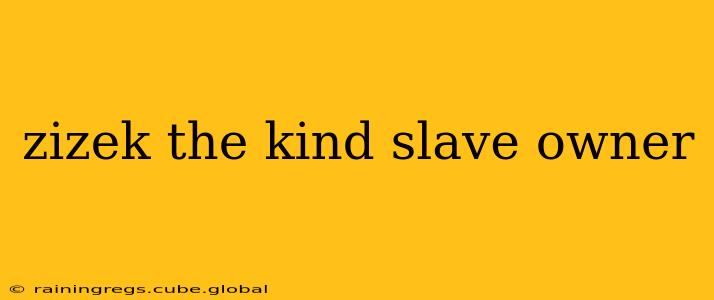Žižek, the "Kind" Slave Owner: Deconstructing the Paradox of Ideology
Slavery, a brutal system built on exploitation and dehumanization, stands in stark contrast to the concept of "kindness." However, Slavoj Žižek, the renowned Slovenian philosopher, frequently employs provocative and paradoxical examples to dissect ideological structures. His work often grapples with the insidious ways in which seemingly benign actions can perpetuate oppressive systems. While Žižek himself has never owned slaves, examining his theoretical framework allows us to explore how even a "kind" slave owner participates in the perpetuation of slavery. This isn't about claiming Žižek advocates for slavery, but rather using his work to understand how seemingly benevolent actions can mask and reinforce power imbalances.
What is the paradox of a "kind" slave owner in Žižek's work?
Žižek's analysis delves into the complexities of ideology. A "kind" slave owner, in this context, isn't necessarily someone who is inherently good-natured. Rather, it represents someone who believes they are treating their slaves "well" – perhaps providing better food, housing, or even a degree of autonomy compared to other slave owners. This "kindness," however, ultimately reinforces the system of slavery. It doesn't challenge the fundamental power dynamic; it simply softens its harsh edges. This "kindness" becomes a tool to maintain the status quo and prevent genuine emancipation. The slave, despite the improved treatment, remains enslaved, their agency still fundamentally suppressed.
Doesn't Žižek believe that kindness is inherently good?
No, Žižek's perspective on kindness is nuanced. He's not inherently opposed to kindness, but instead critical of its ideological function. Kindness, in the context of oppressive systems, can act as a form of ideological camouflage. It masks the underlying injustice, allowing the system to continue unchallenged. The "kind" act becomes a way to alleviate the guilt associated with the inherently unjust system without ever addressing the root cause. It's a form of symbolic compensation that deflects from the systemic violence.
How does this relate to other ideological structures?
Žižek's analysis of the "kind" slave owner can be applied to numerous other ideological structures. Consider, for example, the benevolent capitalist who provides generous employee benefits while simultaneously exploiting workers through low wages and precarious employment. Or a state that offers social programs while maintaining oppressive policies towards marginalized groups. In each case, the "kindness" functions as a tool to maintain the system's power dynamic, masking its inherent injustices.
What is the solution?
Žižek wouldn't advocate for simply replacing "kindness" with cruelty. His approach focuses on critically examining the underlying structures of power that enable the injustices, regardless of the surface-level actions. It's about challenging the entire system, not just mitigating its symptoms. A true solution involves dismantling the structures that create and sustain the power imbalance, rather than simply offering ameliorative gestures within the existing system. This requires a radical rethinking of our social and political structures, demanding a fundamental shift in power dynamics.
Can we find specific examples in Žižek's work that illustrate this concept?
While Žižek doesn't explicitly use the phrase "kind slave owner," his work is rife with examples demonstrating the deceptive nature of surface-level benevolence within oppressive structures. His analyses of ideology, often involving seemingly minor acts that reinforce larger systems of power, directly inform this understanding. Unfortunately, citing specific page numbers from his vast body of work would be impractical and potentially misleading without significant context. His works explore this idea across numerous discussions of ideology, capitalism, and the power structures that determine the social order.
Conclusion:
The notion of a "kind" slave owner serves as a powerful illustration of Žižek's critical approach to ideology. It underscores how seemingly benign acts can mask and reinforce oppression. By understanding this paradox, we can better identify the insidious ways in which seemingly benevolent actions can perpetuate unjust systems and work towards dismantling them instead of merely managing their symptoms. This requires a thorough examination of underlying power dynamics and a willingness to challenge those structures, rather than accepting superficial displays of compassion as sufficient.
